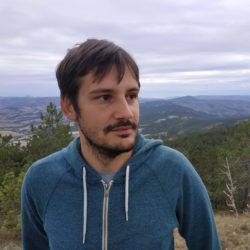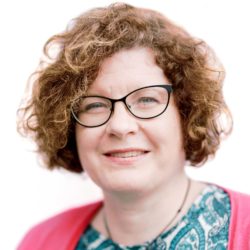

Many hope that in the future technology will help us to learn but also allow more time to think about what it means to be a human being. Photo: Shutterstock
Many hope that in the future technology will help us to learn but also allow more time to think about what it means to be a human being. Photo: Shutterstock
Adult education experts and researchers from Serbia, Belgium and Finland share their vision for what learning could and should look like in the coming years.
Nikola Koruga, Serbia:
“I am working at the Department of Pedagogy and Andragogy at University of Belgrade, researching how utopia influences critical thinking and learning.
Utopia, to me, means ways of imagining a better world, and I am interested in how this is connected to our ability to learn. For example, when we are promoting certain things as best examples of lifelong learning, the choices we make are linked to how we imagine our future to be.
In my mind, utopia is never a blueprint for an idealistic society, but rather a never-ending process of looking for better ways to live and co-operate. It means thinking outside the box and creating new visions, not just solving problems that already exist.
For example, I am enthusiastic about technology, but I also believe that if we do not have the space for imagining how technology can improve the world, things can go very wrong. No new technology automatically saves us or ruins us.
We should not underestimate the motivational power of hope.
My fear for the future is that artificial intelligence could push us into being merely consumers. I am also worried about the rising nationalistic narratives and “us against them” mentality across Europe and the world. Instead, we should be open to radical ideas of working together to fix the current weaknesses of democracy.
I hope that, in the future, technology will help us to learn but also allow us more time to think about what it means to be a human being, what it means to be a part of nature and what it means to communicate with others.
I also think neuroscience and cognitive science will play an important role in showing the full capacity of our brain and ability to learn.
Craig A. Hammond, in his book “Hope, Utopia and Creativity in Higher Education”, highlights the importance of hope for the transformative and collaborative potential of education. We should not underestimate the motivational power of hope. How can we educate students to hope for a better world?”
Nikola Koruga:
- A Ph.D. student and teaching assistant in the Faculty of Philosophy, Belgrade University
- Currently researching the relation between utopian and critical thinking in adult learning
- Background in community and adult education, eLearning and the NGO sector. Sometimes he is also an artist.

Leen Gorissen, Belgium:
“I believe technology is important but only if it is used with the right level of consciousness. So, the area where the most progress is needed is not technology itself but the mindsets of people.
AI, for instance can be a great tool, not only for humanity but for the planet, but if we unleash AI without any understanding of Natural intelligence (NI), then that is just downright foolish.
NI is the intelligence that has kept life going for billions of years despite massive change and disruption. It is about the deep principles and patterns that have made life on our planet so successful. You can call them the Prime Directives that make nature work. They matter because going against the ways in which life works is inherently inefficient. It costs energy, resources, health and spirit.
NI shows us that there is another way. One of the best ways of learning about NI is through nature immersions. I once took more than 20 bankers into the woods to explore how forests invest in the future. Since forests have been around for millions of years, their investment strategies have been successful. Imagine if banks learned to do the same?
Most banks today are still investing in degradation, but what if they could catalyse regeneration, leaving the world healthier, wealthier, more viable and more sustainable? Now, there is a story that I would like to see unfold.
Our car-infested cities are making people more obtuse.
My dystopia for learning is that we are descending into even lower levels of awareness and consciousness. And we have created the ideal conditions for that to happen. Research shows that pollution, and especially air pollution, has significant negative impacts on cognitive abilities. So, our car-infested cities are making people more obtuse.
My dream is that we will finally realise that what we do to nature, we do to ourselves. This insight could activate us into a fundamental transformation of the ways in which we think (because it is our thinking that shapes the material world), of the ways in which we behave (the things we do for each other, who we need to be to move the world forward) and of the ways in which we design, develop and organise the world.
Leen Gorissen:
- Ph.D. in Biology, is specialised in ecology, transition science, regenerative design and bio-inspired innovation
- Author of the recent book ‘Building the Future of Innovation on millions of years of Natural Intelligence’
- Founder of Centre4NI, a catalyst that helps organisations and businesses to innovate like nature does
- Frequently asked to evaluate innovation projects by the European Commission

Marion Fields, Finland:
“I have been interested in futures thinking ever since my organisation, the Sivis Study Centre, conducted its first voluntary sector skills needs survey in 2012. I am interested in discovering how we can provide learning that helps adults acquire competences to help them make sense of the world, both today and tomorrow.
We have designed a foresight tool for voluntary organisations, as their need for related skills is rising sharply due to growing uncertainty: in 2018 around 40% of respondents from the Finnish voluntary sector chose this as a skills need, but in 2020 this share had risen to 63%.
I am hoping for a renaissance in peer learning.
Uncertainty causes worry. Some voluntary organisations are concerned about losing members and learners: “What if they don’t find their way back after the pandemic.”
Adult education providers have taken huge leaps in going online and managed to reach out, but as we know, throughout Europe the gap in digital skills remains big. Some of our members were pleasantly surprised, however, when they managed to engage learners they thought would not be able to join online activities.
Another concern is our visibility. Adult education is needed more than ever, but I have been hearing worries about how to demonstrate impact when everything takes place in a digital environment. Can we continue to offer learning that will still transform people’s lives?
We need to rethink community and how we build it online and in hybrid environments. As one solution, I am hoping for a renaissance in peer learning. We should provide our learners with platforms to continue exploring what they have learned together.
I think we need a bit of science fiction in our lives: imagination in our vision and work. I often catch myself surrendering to the tyranny of the now: the inability to imagine different futures and to design learning with that vision in mind. Learners’ needs will change in time.
Still, I am an optimist. Adult education continues to have plenty to offer in helping us to solve the many wicked problems that lie ahead: climate change and the crisis of democracy, to name but a few.“
Marion Fields:
- Ph.D., works as a specialist at the Sivis Study Centre, a Finnish liberal adult education provider that works with the voluntary sector, supporting learning and education in NGOs and voluntary organisations
- Current interests in adult education cover foresight, impact, transformative learning, dialogue, sustainability and Bildung as a concept

Author







